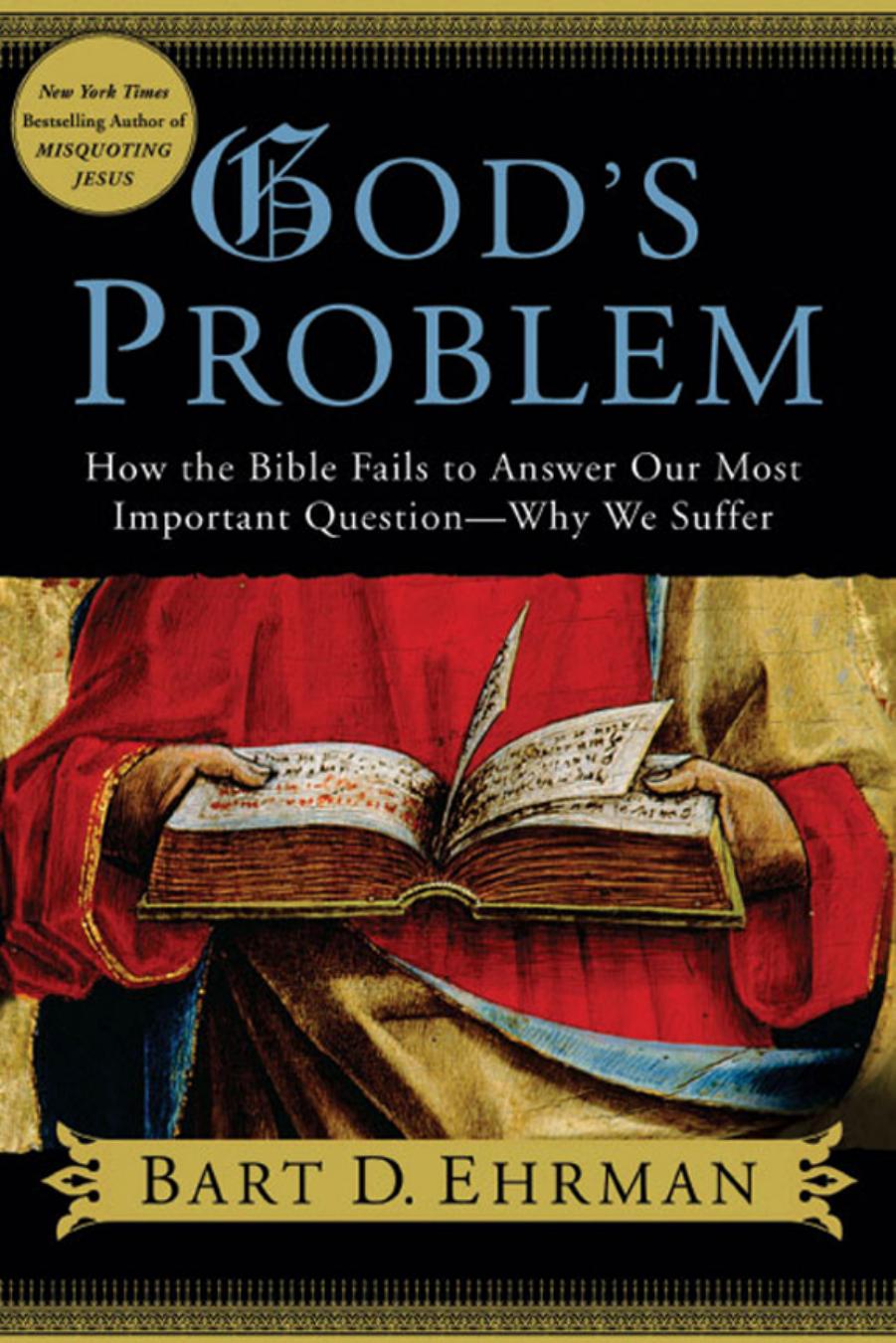God's Problem by How the Bible Fails to Answer Our Most Important Question Why We Suffer by Bart D. Ehrman

Author:How the Bible Fails to Answer Our Most Important Question, Why We Suffer by Bart D. Ehrman [How the Bible Fails to Answer Our Most Important Question, Why We Suffer by Bart D. Ehrman]
Language: eng
Format: epub, pdf
Published: 0101-01-01T00:00:00+00:00
There is no better way to identify the overarching message of the book than simply to consider its powerful opening lines. In them the author identifies himself as the son of David and the king in Jerusalem (Eccles. 1:1). The author, in other words, is claiming to be none other than Solomon—known from other traditions as the
“wisest man on earth.” Scholars are reasonably sure, however, that whoever wrote this book, it could not have been Solomon. Just on the linguistic level, the Hebrew of the book has been influenced by later forms of the Aramaic language, and it contains a couple of Persian loanwords—plausible only after the thinkers of Israel had been influenced by the thinkers of Persia (i.e., after the Babylonian exile). Usually this book is dated to about the third century BCE
(some seven hundred years after Solomon himself). In any event, its opening statement virtually says it all:
The words of the Teacher, the son
of David, king in Jerusalem.
Vanity of vanities, says the
Teacher,
vanity of vanities! All is vanity.
What do people gain from all the
toil
at which they toil under the
sun?
A generation goes, and a
generation
comes,
but the earth remains forever.
The sun rises and the sun goes
down,
and hurries to the place where it
rises.
191
Does Suffering Make Sense?
The wind blows to the south,
and goes around to the north;
round and round goes the wind,
and on its circuits the wind
returns. . . .
All things are wearisome;
more than one can express;
the eye is not satisfied with seeing,
or the ear filled with hearing.
What has been is what will be,
and what has been done is what
will
be
done;
there is nothing new under the
sun.
Is there a thing of which it is said,
“See, this is new”?
It has already been
in the ages before us.
The people of long ago are not
remembered,
nor will there be any
remembrance
of people yet to come
by those who come after them. (Eccles. 1:1–6, 8–11)
The key term here is vanity. All of life is vanity. It passes by quickly, and then is gone. The Hebrew word is hevel, a word that can also be translated “emptiness,” “absurdity,” “uselessness.” Hevel literally refers to a mist that evaporates, so that its root idea is something like “fleeting,” “ephemeral.” The word occurs about thirty times in this relatively short book. For this author, everything in the world is ephemeral and destined soon to pass away—even we ourselves. Placing ultimate value and putting ultimate importance in the things of this world is useless, vain; all things are fleeting, ephemeral.
192
G O D ’ S P R O B L E M
In the guise of Solomon, this author indicates that he tried everything in order to make life meaningful. He sought for great wisdom, he indulged himself in pleasure, he engaged in large building projects, he accumulated masses of possessions (Eccles. 1:16–
2:23); but then he reflected on the meaning of it all: “I considered all that my hands had done and the toil I had spent in doing it, and again, all was vanity and a chasing after wind, and there was nothing to be gained under the sun” (Eccles. 2:11).
Download
God's Problem by How the Bible Fails to Answer Our Most Important Question Why We Suffer by Bart D. Ehrman.pdf
This site does not store any files on its server. We only index and link to content provided by other sites. Please contact the content providers to delete copyright contents if any and email us, we'll remove relevant links or contents immediately.
The Five People You Meet in Heaven by Mitch Albom(3562)
The Secret Power of Speaking God's Word by Joyce Meyer(3184)
Real Sex by Lauren F. Winner(3016)
Name Book, The: Over 10,000 Names--Their Meanings, Origins, and Spiritual Significance by Astoria Dorothy(2982)
The Holy Spirit by Billy Graham(2944)
0041152001443424520 .pdf by Unknown(2843)
How The Mind Works by Steven Pinker(2813)
ESV Study Bible by Crossway(2774)
Ancient Worlds by Michael Scott(2682)
Churchill by Paul Johnson(2578)
The Meaning of the Library by unknow(2565)
The ESV Study Bible by Crossway Bibles(2550)
The Gnostic Gospels by Pagels Elaine(2527)
MOSES THE EGYPTIAN by Jan Assmann(2412)
Jesus by Paul Johnson(2352)
City of Stairs by Robert Jackson Bennett(2348)
The Complete Dead Sea Scrolls in English (7th Edition) (Penguin Classics) by Geza Vermes(2277)
The Nativity by Geza Vermes(2227)
Ancient Near Eastern Thought and the Old Testament by John H. Walton(2224)
